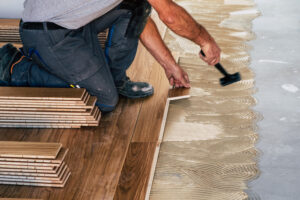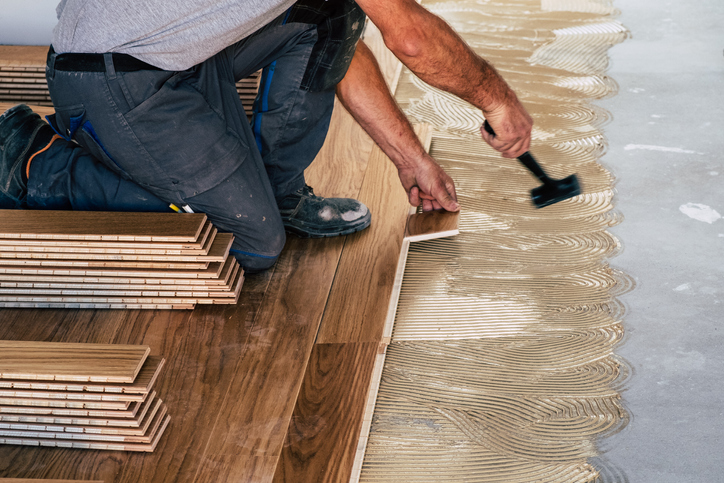Flooring Contractor Dallas TX installs, repairs, and replaces floor surfaces in homes and businesses. These professionals can work with a variety of materials, including ceramic tile, carpet, vinyl, and wood.
General liability insurance protects flooring contractors from claims made by third parties arising out of a jobsite. Even if you impose strict safety standards on your crew, accidents can happen.
One of the most popular services offered by flooring contractors is new floor installation. They can help homeowners choose and install wood, tile, vinyl, or carpet floors that match the existing home decor and add value to the property. Flooring professionals can also prepare the subfloor to receive these floor coverings or refinish and repair existing floors. They may even be hired to restore historic flooring materials like hardwood or certain types of tile and stone.
To perform their duties, flooring contractors must be able to read blueprints, measure, and estimate project costs. They must also be able to work well with other building tradespeople and understand construction materials and processes. Most communities require flooring contractors to be licensed with a contractor’s license board. This usually involves a minimum of two years of on-the-job experience, passing a written exam, and having a high school diploma or equivalent.
Many flooring contractors operate showrooms where customers can see samples of various floor materials and get a better idea of what they look like in a room. Some also stock popular flooring brands and sell them directly to consumers. The majority of the work performed by flooring contractors, however, is done on the job site in homes and businesses.
For this reason, it is important for prospective clients to ask their flooring contractors a few key questions before hiring them. First, they should ask the contractor if they are insured and if the insurance covers liability and workers’ compensation. This information will give the client peace of mind, knowing that in the unlikely event of an accident or injury, the flooring contractor is covered.
The flooring contractor should also provide details about their payment schedule and whether a deposit is required upfront to begin the work. They should also specify whether furniture removal and cleanup are included in the total price. Finally, the flooring contractor should let the client know if they expect any fees to be charged for travel or distance outside of the service area.
When choosing a flooring contractor, potential clients should request quotes from several reputable companies in their area. This will allow them to compare prices, customer reviews, and credentials. It’s also a good idea to find out how long the flooring contractor has been in business and whether they have a physical address and a verified business license. Finally, they should be wary of any contractors who request a large cash deposit or the full project cost up front.
Repair
No matter how careful you are, your flooring will eventually show signs of wear and tear. Fortunately, your local flooring contractor can usually fix the problem without replacing the entire floorboard. This is a much less expensive and environmentally impactful solution than removing the damaged board and installing new wood or other flooring materials.
The cost of repairing your flooring varies depending on the type of repair and the amount of material required. A simple refinishing job can cost between $3 and $5 per square foot, while a full flooring replacement will be significantly more costly. A certified professional can also help you choose the best material for your home.
Common repairs include scratches, sun fading, and water damage. Scratches can be removed with a light sanding of the affected area, followed by staining and finishing to match the rest of the floor. Water damage is usually caused by a leak or spill. If the leak is not fixed quickly, it can lead to a large number of problems in your home, including mold and mildew. A flooring contractor can help you clean the floor, remove and replace any damaged boards, and prevent future water damage.
For laminate floors, small chips can be repaired with a putty that matches the color of your existing flooring. For larger chips, it may be necessary to remove the surrounding board and cut out the damaged section before laying in a new one. For hardwood flooring, the damage may be more severe and require a complete board replacement. A flooring contractor can remove the damaged section, glue or nail a replacement in its place, fill cracks, sand, and finish the new surface to match the rest of the room.
Regardless of the type of flooring, it is important to check your manufacturer’s warranty to make sure that your repairs are covered. Most warranties cover only the actual product, while others offer additional coverage. These extended warranties can be very helpful in managing the risk of your flooring installation, as they cover the cost of a repair or replacement in the event that something goes wrong. They can be purchased from many flooring retailers or from the flooring contractor directly.
Replacement
If you have an existing floor that needs to be replaced, a flooring contractor can do the job for you. This service typically includes both the removal of the old floors and the installation of the new ones. It can be a great way to give your home a new look without spending a fortune. It’s a good idea to ask a few different contractors to submit quotes for your project so you can compare prices. Then, choose the one that will best suit your budget.
The acclimation of wood floors is an important part of any installation process. This means allowing the new floors to be exposed to normal temperature and humidity levels before putting them in use. It can take anywhere from a few days to a couple of weeks for the wood to get used to its new environment. A professional flooring contractor will ensure that the acclimation process is done properly to avoid any problems later on.
Most flooring materials will need some form of underlayment to help with sound absorption and moisture protection. The cost of this is usually included in the overall price of the floor itself. A good-quality underlayment can prolong the life of your floors and prevent damage to the subfloor.
Another service that a flooring contractor can offer is maintenance services for your floors. This may include cleaning, refinishing, or buffing. Some manufacturers also offer these types of services for their products as part of the warranty package.
Some flooring companies also work with their clients to design and layout floor plans, which can reduce the amount of time the customer has to spend maintaining their floors. This can also minimize the amount of maintenance that will be needed in the future. This type of service can be a very valuable asset to any homeowner or business owner.
A flooring contractor can also help you choose the right floors for your space, including color and texture. This can make a big difference in how your room looks and feels. Choosing the right floors can also increase the value of your home or business. If you are looking to sell your home, you may want to consider replacing your floors before putting it on the market. This can be a great way to attract potential buyers and get your home sold quickly.
Maintenance
Flooring can be one of the most long-lasting and beautiful design elements in a room. Whether it’s a stately residential living room or an apartment kitchen, well-maintained floors can last for more than a century and add considerable value to a property.
A professional flooring contractor will offer services to maintain and prolong the life of floor surfaces. This can include refinishing, repair, and stain removal. This is an important service to offer, as the lifespan of a floor depends greatly on how it is cared for.
For example, refinishing can add years to the life of hardwood floors. In addition, regular sweeping and dust mopping of hard floors will prevent scratching and keep the surface free from dirt and grime. Vacuuming is also essential and should be done weekly to avoid any dirt or debris buildup. In order to protect your investment and extend the life of your new flooring, it is important to follow the manufacturer’s recommended maintenance instructions for your specific product.
The majority of flooring contractors are not only licensed to install a variety of floor covering materials but may also have a business license, commercial general liability insurance, and, in some cases, a contractor surety bond. They have extensive knowledge of a wide range of building products and are able to provide the appropriate solutions for any space, architectural style, or budget.
Flooring contractors are skilled in on-site inspections and the analysis of drawings to make sure they meet the specifications set forth by the client. They can also coordinate the scheduling of flooring installation and other tradesmen to make sure all projects are completed on time. In the commercial market, flooring contractors must be able to work under tight construction schedules and may be expected to provide routine maintenance after completion.
When a flooring contractor is licensed, it shows they are a qualified professional that you can trust with your project. A licensed contractor will be able to tell you about their education, certifications, and insurance coverage. For example, if you are having your basement worked on, you should be sure the contractor you hire is a licensed plumber to ensure they disconnect and reconnect all water and gas lines. This can save you a lot of money and hassle in the long run.
